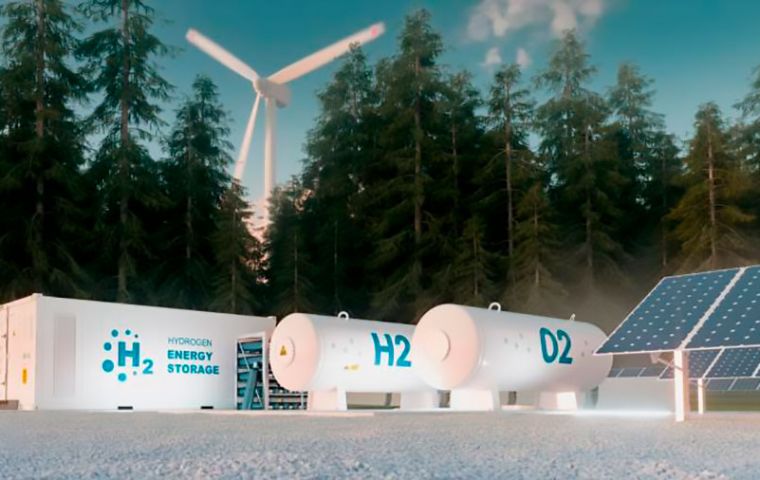MercoPress. South Atlantic News Agency
World Bank approves $150 million loan to boost green hydrogen investment in Chile
 This collaboration aims to expedite hydrogen deployment in emerging markets and developing countries
This collaboration aims to expedite hydrogen deployment in emerging markets and developing countries In a significant move towards promoting sustainable energy solutions, the World Bank Board of Directors has approved a loan of $150 million to support green hydrogen projects in Chile. This loan marks the World Bank's first endeavor in promoting green hydrogen and aligns with Chile's commitment to achieving carbon neutrality by 2050. The investment aims to accelerate the country's green growth, energy transition, and foster a resilient and inclusive economic development.
The project, titled the Chile Green Hydrogen Facility to Support A Green, Resilient, and Inclusive Economic Development, will primarily benefit local communities involved in the production and utilization of clean hydrogen. It is expected to generate green jobs, stimulate economic growth, and aid in decarbonizing local industries. The initiative will be implemented by the Chilean Production Development Corporation (CORFO), which will establish a blended finance fund dedicated to green hydrogen projects and develop risk mitigation instruments to enhance financing conditions. Additionally, technical assistance will be provided to facilitate the industry's development.
Carlos Felipe Jaramillo, World Bank Vice President for Latin America and the Caribbean, highlighted Chile's unique advantages for fostering a competitive green hydrogen industry. The country possesses abundant renewable resources and has demonstrated its ability to attract investments in large-scale clean energy projects. Jaramillo emphasized that Chile has the potential to become a significant global player in the green hydrogen sector, setting an example for other countries in Latin America and the Caribbean.
Through this loan, the World Bank aims to mobilize financial resources from the private sector and other multilateral partners to drive the development of this emerging industry. Furthermore, the financial instrument is expected to attract additional private sector investments, amounting to at least $280 million. By encouraging early investment in green hydrogen production, the project seeks to expedite the transition from pilot projects to commercial-scale operations.
Chilean Finance Minister Mario Marcel acknowledged the country's favorable circumstances for future development, particularly in industries where it holds a comparative advantage. Marcel emphasized that as the world experiences a significant shift towards a more environmentally friendly economy, seizing opportunities is crucial.
Chile has set ambitious goals for its green hydrogen sector. By 2030, the country aims to produce the world's lowest-cost hydrogen, and by 2040, it envisions being among the top three hydrogen exporters globally. According to estimates from Chile's National Green Hydrogen Strategy, this industry has the potential to attract up to $330 billion in private investments and generate around $30 billion in exports by 2050.
The implementing unit, CORFO, is also a partner of the Hydrogen for Development (H4D) Partnership—an initiative managed by the World Bank's Energy Sector Management Assistance Program (ESMAP). This collaboration aims to expedite hydrogen deployment in emerging markets and developing countries.
Green hydrogen, produced by using renewable energy to split water molecules, holds immense potential for decarbonizing sectors where electrification may not be viable, such as manufacturing and heavy or long-distance transportation. Its utilization can enhance energy security by enabling the long-term storage of renewable energy and facilitating its integration into power grids. Additionally, the development of the green hydrogen industry can contribute to strengthening food security by utilizing green hydrogen in the production of green ammonia, a key input for fertilizers.
With the World Bank's financial support, Chile is poised to become a global leader in green hydrogen production, showcasing the country's commitment to sustainable development and combatting climate change.




Top Comments
Disclaimer & comment rules-

Read all commentsThe raw material of green hydrogen is the sun. Chile is not the most appropriate place to invest.
Jun 29th, 2023 - 03:55 pm -3As Chicureo said: lots of fun and snow. And barbecue.
O nome disso é propaganda.
Commenting for this story is now closed.
If you have a Facebook account, become a fan and comment on our Facebook Page!